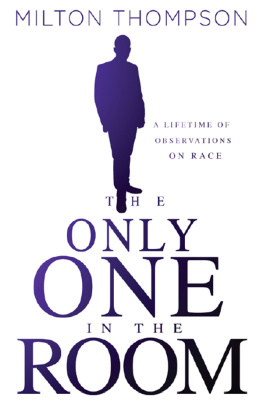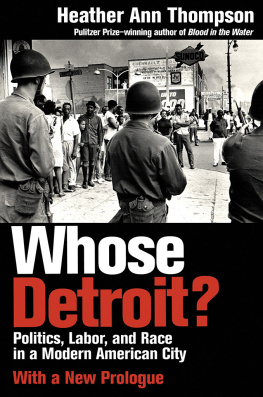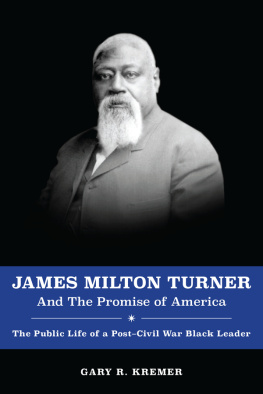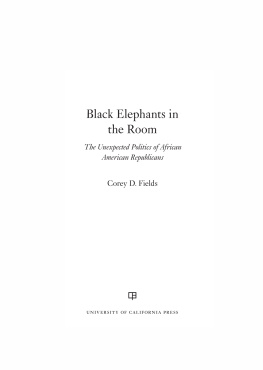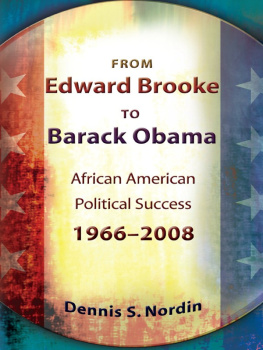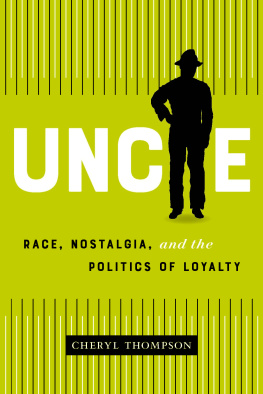THE ONLY ONE IN THE ROOM by Milton Thompson
Published by Creation House
A Charisma Media Company
600 Rinehart Road
Lake Mary, Florida 32746
www.charismamedia.com
This book or parts thereof may not be reproduced in any form, stored in a retrieval system, or transmitted in any form by any meanselectronic, mechanical, photocopy, recording, or otherwisewithout prior written permission of the publisher, except as provided by United States of America copyright law.
Unless otherwise noted, all Scripture quotations are from the King James Version of the Bible.
Scripture quotations marked GNB are from Good News Translation, second edition. Copyright 1992 by American Bible Society. Used by permission.
Scripture quotations marked JUB are from The Jubilee Bible, Ed. Russell M. Stendal. Copyright 2000, 2001, 2010 by Life Sentence Publishing, LLC.
Scripture quotations marked NIV are from the Holy Bible, New International Version of the Bible. Copyright 1973, 1978, 1984, International Bible Society. Used by permission.
Scripture quotations marked NKJV are from the New King James Version of the Bible. Copyright 1979, 1980, 1982 by Thomas Nelson, Inc., publishers. Used by permission.
Scripture quotations marked NAS are from the New American Standard Bible. Copyright 1960, 1962, 1963, 1968, 1971, 1972, 1973, 1975, 1977 by the Lockman Foundation. Used by permission. (www.Lockman.org)
Scripture quotations marked AMP are from the Amplified Bible. Old Testament copyright 1965, 1987 by the Zondervan Corporation. The Amplified New Testament
Copyright 1954, 1958, 1987 by the Lockman Foundation.
Used by permission.
Design Director: Justin Evans
Cover design by Lisa McClure
Copyright 2016 by Milton Thompson
All rights reserved.
Visit the authors Web sites: livingstonescharismatic.com and thompsonstories.com
Library of Congress Cataloging-in-Publication Data: 2016938850
International Standard Book Number: 978-1-62998-540-4
E-book International Standard Book Number: 978-1-62998-541-1
While the author has made every effort to provide accurate telephone numbers and Internet addresses at the time of publication, neither the publisher nor the author assumes any responsibility for errors or for changes that occur after publication.
CONTENTS
I HAVE A LOT to be grateful for. Daily I thank God for what I have and the blessings and opportunities that have come my way. My life could have been a lot different had He not given me the family I have and the guidance Ive received.
I want to thank God for making me who I am, including the race that I am. The history of the struggle of my people is not only a part of my DNA, but it has also been woven into my own narrative. Over the years as I have tried to find acceptance and my own place in the fabric of this nation, the struggle has left wounds, and as a result I have not always considered it a blessing to be black. But Ive always been aware of Gods guidance throughout multiple generations of my family.
God has been my anchor throughout my entire lifetime, and when my identity has been tossed to and fro I have found comfort and some degree of stability in His presence. His Word has also endowed me with a sense of purpose. For this I am eternally grateful to Him. The things I dont fully comprehend fall within the words of the apostle Paul in the New Testament: For now we see through a glass darkly; but then face to face: now I know in part; but then shall I know even as also I am known (1 Cor. 13:12, KJV).
I also want to acknowledge the key people who have made me who I am today. I have seen the anger of young black men who grew up without a father to help them make sense of the world, but I was blessed to have had two parents who loved me. Arzell and Mary Thompson are two people you will meet in this book. They worked hard to put food on the table and a roof over my head, always encouraging me to live a better life than they did. They provided stability and showed me what a family should be like. In my formative years no one impacted my thoughts and experiences about life and race more than my parents.
Like many people of my heritage, they endured hardship and displayed a humility that arose from their faith in the midst of the things that they suffered. Any degree of dignity that is displayed in our family derives from our parents wisdom, common sense, and grit. They left the Jim Crow South, moved north, lived long lives, and left a legacy behind in their sons, Lewis, Linton, James, Arzell Jr., Stanley, and myself. Their old-fashioned discipline (with a switch) and a no-nonsense approach, though primitive by todays enlightened class, put the fear of God and a respect for others within us. They sacrificed much so that we could have the lives that we presently enjoy, and for this we are truly thankful.
I also want to thank God for my in-laws, Charles and Mavis Might. They welcomed me, a black man, into their white family during a time when interracial marriage was unconventional to say the least. When my wife, Peggy, asked her father about marrying me, he affirmed to his daughter, Any son of Arzell Thompson is good enough to marry my daughter. I was young and in need of the guidance of many strong hands. Their belief in my potential supplemented that of my own parents and provided me with a double portion. I acknowledge their encouragement and support, and someday I will thank them personally before the throne of grace.
Last of all I want to thank the most important person in my life: my wife. Peggys parents took her to NAACP meetings when she was a young child in Ohio. They also intentionally enrolled her in schools that had black and Hispanic children during the 1950s. They instilled in her a sense of love, mercy, and justice toward all who suffer unjustly. Peggy has watched me go through a lifetime of wrestling with my identity as a black man in America, all the while comforting, strengthening, and encouraging me. She has watched me fight the rejection, self-doubt, and loneliness that have come with trying to find my way in a society that continues to struggle with race.
Though interracial marriage is not uncommon today, it was not so in 1976 when we first married. Peggy has endured the stares, ridicule, and hatred of those who wondered how she could marry someone of an inferior group. She is my hero, though it has taken me awhile to realize that I have not been in this struggle alone.
I F YOU PAY attention to our national conversation its no secret that the media steers that dialogue. Some current events, like natural disasters, generate continual coverage, while others, like the persecution of Christians, are barely noticed. And then there are topics that rise and fall because, frankly, the public becomes weary of talking about them. Race is such a topic.
When I first started writing this book race was hardly on the national radar screen. There was very little conversation about it. Then in 2014 Michael Brown was shot in Ferguson, Missouri, by a white police officer. Eric Garner died in New York after being placed in a chokehold by police officers. Tamir Rice, a twelve-year-old boy, was shot in Ohio when officers thought his pellet gun was a real gun. Suddenly buildings were burning, cop cars were demolished, and private businesses that people spent a lifetime building were literally destroyed in minutes as a result of rioting, violent demonstrations, and looting.
There were many groups that weighed in on the intolerable incidents that began to surface week after week. The Black Lives Matter protests began as one such group and quickly evolved into a national movement with no small degree of controversy. They gained the national spotlight when their demonstrations interrupted the speeches of presidential candidates and stopped traffic in major cities. While some saw this as a nuisance and questioned what the fuss was about, I found their participation in the dialogue of race helpful.

